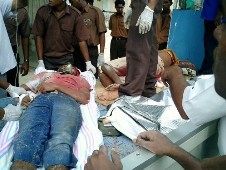The Commission of National Inquiry (CNI) report will not be released to authorities and former President Mohamed Nasheed for at least a further 24 hours, authorities in the Maldives have today confirmed.
The President’s Office has previously said that it anticipated receiving the report by today. However, speaking at the time of press, President’s Office Media Secretary Masood Imad denied that the government had expected a completed copy of findings to be received today.
President Mohamed Waheed Hassan agreed last month to extend the deadline by which the CNI must conclude its report into February’s transfer of power by August 30, 2012. CNI Co-Chair – retired Singaporean Judge G P Selvam – had requested a deadline extension in order to conclude the report due to the hundreds of people wishing to provide information.
When contacted by Minivan News, a spokesperson for the CNI office confirmed that the final deadline to release the report would now be tomorrow, but declined to give a reason for the delay.
Earlier this week, former President Nasheed’s representative on the CNI panel, Ahmed ‘Gahaa’ Saeed, expressed concern over a draft report compiled by the commission’s co-chair Judge Selvam. Saeed alleged that there were “significant gaps” in the report concerning certain evidence and statements that had been given to the commission during its investigation.
A statement released by the CNI today, said that no material obtained as part of its investigation had been lost or mislaid.
“All interviews, evidence and information received to the commission have been stored in a safe and secure manner. Hence this commission is quite certain that no material have been lost or mislaid,” the statement read, according to local newspaper Haveeru. While the CNI has confirmed the authenticity of the statement, Minivan News has yet to see of copy of the document.
Among the stakeholders expecting to receive the CNI report today were the Maldivian Democratic Party (MDP), which contends that its presidential candidate Mohamed Nasheed was removed from office during the events of February 7 in a “coup d’etat”.
The validity of these allegations is at the centre of the CNI’s investigation.
MDP MP and Spokesperson Hamid Abdul Ghafoor said that there had previously been “an understanding” that former President Nasheed was to have received the report between 9:00am and 12:00pm today, alongside authorities including the President’s Office, parliament and the Prosecutor General’s (PG’s) Office. Ghafoor said that the party was now expecting to receive the report at the same time as the public tomorrow.
“It appears that [the CNI] have changed their minds and are releasing the report in one go,” he said.
According to Ghafoor, the decision to provide the report to key stakeholders like the government and parliament before a wider public release had been decided to allow time for the report to be reviewed by various state institutions and political parties.
“This would have helped, as they way it looks right now, it doesn’t seem the CNI will address Mr Saeed’s concerns. Over the last three days we have not heard from the CNI at all regarding issues such as whether they would include CCTV footage from the President’s Office building [on February 7],” he claimed. “This means we will not be able to fill the gaps in the report before they bring it out.”
In a statement released this week, the Commonwealth Secretary-General’s Special Envoy to Maldives, Sir Donald McKinnon, called on all “Maldivian stakeholders” to address the CNI’s findings in a calm and responsible manner.
“I look forward to the imminent completion of the work of the reconstituted Commission of National Inquiry and to its being able to agree on its report,” Mckinnon stated. “As we approach the release of that report, I would encourage all stakeholders to respect the commission’s findings, and to take time to reflect carefully on how to act upon them in a manner that maintains harmony in Maldivian society and helps strengthen democratic practice and institutions in the country.”
Responding to the statement, Ghafoor said he hoped the next 24 hours would be used by the CNI panel to try and find agreement on the report’s findings in light of Saaed’s concerns over the earlier the draft.
“[Commonwealth] Special Envoy Sir Donalod Mckinnnoon has this week talked about finding consensus on the findings,” he said. “However, if this consensus is not found between the commission’s members, then we would have to question if the CNI report was the report outlined in the Commonwealth’s recommendations.”
With the report now scheduled for release tomorrow, Andrew Cox, the United Nations Resident Coordinator in the Maldives said that social media reports claiming the CNI report would be launched from the organisation’s headquarters in Male’ were inaccurate.
“We understand that the CNI report will be directly delivered to the major actors concerned as per prior agreements,” Cox stated. “The report will not be released at the UN Building.”
